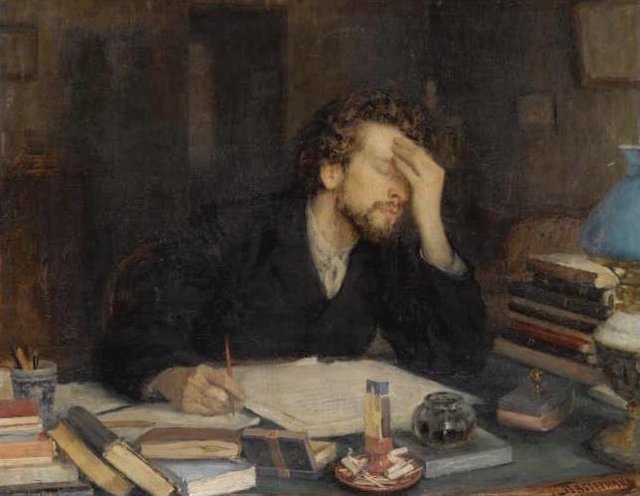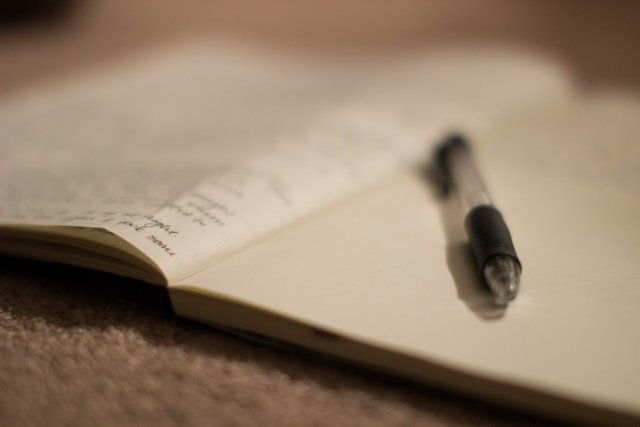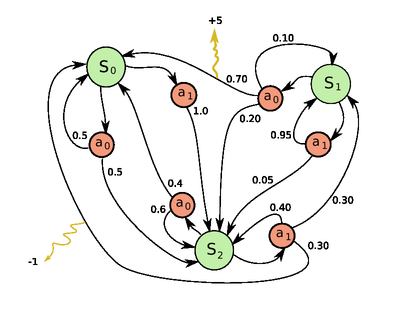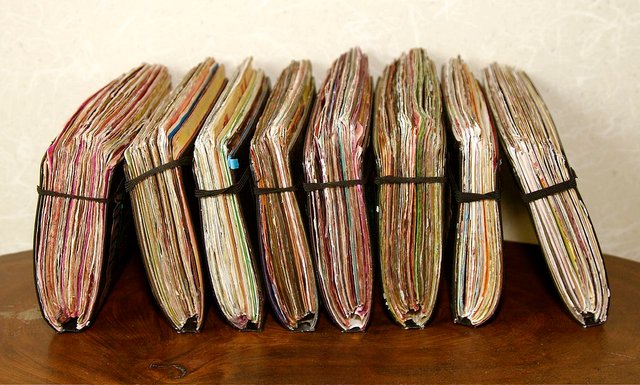Writing on the Edge: Process Journal [NaNoWriMo Prep]
Writing a novel is no easy task. Events must be put in order and scenes carved from them. Your characters must be described and each have a motivation and story that vie for our attention at the tips of pen or fingers clicking away at keyboards.
An important tool for any writer is a process journal. This process journal is where you'll record your thoughts and feelings about whatever project or projects you are working on and the writing process in general! It's useful if this is a completely separate book or document.
"...but Renée" I hear you say "I'm not writing about myself. I'm writing about zombie lesbians from the moon! I don't need to journal about my feelings!"
Remember not to Forget
The most important part of keeping a process journal about my writing is that it helps me remember! It's a record to look back on. Before I got into the habit of writing in my process journal I'd realize the resolution to a plot point I'd been struggling for weeks with, and by the time I got through my day and started to write the brilliant idea I had vanished with the day. Jotting these thoughts down as they come and then when we have time using our journals to look back and pick up that train of through can rescue your revelation!
Ruth's Advice
I first heard of a process journal from novelist, Ruth Ozeki. We were having dinner one night in San Francisco after her book reading and she told me about the radical evolution of the plot of her novel A Tale for the Time Being. Years before the events that made it into the final version of the book, the main character Nao began to speak to Ruth through her process journal. It was her diligent practice at recording her thoughts and creative brainstorming that allowed her to flesh out Nao as a person long before her full story was told. Ruth went through several radically different versions of the same tale and it was her process journal that served as both laboratory and garden to bring the final tale to fruition.
She's also talked about process and the evolution of her novel here: http://www.opb.org/artsandlife/article/ruth-ozekis-long-journey-to-write-a-tale-for-the-time-being/
She encouraged me to be patient and listen for my character's voices. Sometimes they are telling a different story than the one you are trying to write. This difference becomes clear when you go back and read your process journal, she said. It was through her guidance that I began to keep my own process journal and incorporated it into my writing practice.
Writing "Practice"?
I call it a writing practice because it's a regular and intentional activity that establishes and develops routine. Ruth is a sexy, superhero, Buddhist priest. She weaves her spiritual practice in with her writing practice and encourages the use of this word "practice" to describe the process of writing. It's not something we suddenly achieve. It's a thing in motion. It's not a thing, it's a process. It's not static, rather it's a living creature that can be both friend or beast!
How I Use a Process Journal in my Practice.
Although I type up my writing on a keyboard, I keep my process journal in a physical notebook. I try to stick it in my purse wherever I go, so it will always be there when inspiration strikes. I have it next to me when I sit down to write. I use it as a reference book and look at my notes from the last time I've written the day (or week!) prior. Yet, I don't always write in it first thing.
Often, I'll use it to asses what I wrote that day; summing up my daily grind. In it's pages I'll note if my story is working, why; if it sucks, why; if I have a nagging suspicion I'm being cliche, and what do about it, and most importantly where I left off and what I need to accomplish tomorrow. The next day, I'll reach for my process journal first so I don't sit there blinking at my computer screen wondering... who am I, what am I writing, what did I want to accomplish today?
Writing begets more writing.
Write each day before you begin or after you finish writing for the day. Review your writing experience. Document your troublesome plot points, what is giving you difficulty in a scene, anything you've imagined using but can't find a spot for, or maybe it doesn't fit with the current iteration of your story. Write down what you want to get accomplished that day. Use your momentum and motivation from the previous writing session to inspire your next! Getting your ideas out on paper means you can review them, use or save them for later, and best of all free yourself for new ideas.
Freedom!
The journal can be a document free of judgement too. Without censorship or the profound responsibility of writing it as part of "Your Story" you are free to throw ideas around and turn things on their heads. Sketch scenes before you write them, or summarize scenes you've just written. Play with character descriptions, relationships, and intentions within this document and they are preserved. If they don't make it in the pages of this book perhaps they'll often inspire you in the future. Reach for your process journal when it's time to brainstorm. Use it explore your thought process and reasoning as you decide upon certain parts of the tale. Write about your feelings and frustrations too.

Leonid Pasternak's The Passion of Creation
Write as much as you need. It may sound overwhelming to waste some of your daily words on work that may or may not make it into a final version, but starting with a road map or finishing your writing day with a summary of how it went and what you are feeling can be invaluable.
Practice makes perfect
By keeping records, you're able to monitor your writing practice! Your strengths and weaknesses can be identified when you look back over your journals. As you review your journals your pitfalls and also your silver linings will emerge. Write about what you learned about writing as you created your novel. Keep track of your references and sources in your journal.
NaNoWriMo Journal Writing Bonus
During NaNoWriMo use your journal to keep track of your writing goals! You've got a 50,000 word count to keep track of, and if you're not the word-count calendar sort, keep track of your word counts in your process journal. Did you achieve your goal? What helps? What made it harder?
Harvest
When you come across problems in your fiction, you'll find your process journal will be there to save the day! You may need your journal more on certain days. During those dark hours when your plot is cliche and your characters intentions are muddy, your process journal can serve as a guiding light and a voice of clarity.
The benefits of journaling becomes apparent after you've been doing it for a while. Some of the benefits happen immediately, when we collect our thoughts in one place and use them as a sort of to-do list. Adding in writing about your experience of writing can help you handle different situations and can help you determine your techniques and methods that work.
Longer term benefits come to light when we return to our previous journals. When we reread them to gain insight and focus in troubling times, we can begin to see patterns into how we've developed through our writing practice and solutions can emerge.
Don't get overwhelmed with your process journal. It's a tool to support your Story and your story writing. Don't get caught up in perfection.
The most important thing is to write.
NaNoWriMo!!!! 6 weeks away! Come join a Steemit writing team!
NANOWRIMO! Word-count Calendar! Steal this Calendar!
NaNoWriMo Tools - Preparation - Mind Maps and YOU






This is priceless advice. I just started writing my first novel. I've always written, for the joy of it and to find outlet for my over-active imagination, but I've not attempted a long form coherent novel. I'm loving it though. I keep track of all the characters, themes/ideas and research I need to do in seperate googles docs. Noting my own feelings on the process didn't occur to me. This will be really helpful, and likely good inspiration for what characters will go through emotionally.
Will check out NaNoWriMo
btw where is SteemSmart? Withdrawal here.
extraordinary, I'll take some things to improve my work, I izo stake a desicion that had taken, write a histori by Břve to be a lot of work and really have not been lucky today upload a pic and have more votes, the written work. but it made me rethink not abandon writing, really I'm not good with their advice but something will improve thank you very much
Why join steemit to build war?
Why not change history instead
Seek less control pls, no one is above or below anyone else in here.
Wonderful advice!
I currently use a notebook for something similar, but I've always restricted it to pre-writing. There's something about the tactile nature of notebooks and note cards, pens scratching out cursive script, that just seems more conducive to creating fresh ideas.
But, I enjoy the idea of using it to document the journey through the story, as well! To keep yourself centered and present while you're moving forward through your fictional world.
I think I'll try integrating this into the novel I'm currently working on.
It never hurts to have more tools in the shed!